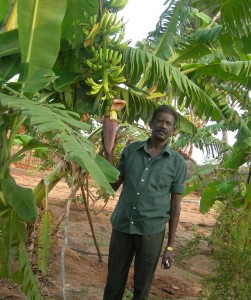 Why plant trees?
Why plant trees?
Trees can satisfy all the essential needs of rural villagers, providing food, animal fodder, fuel and medicine as well as much-needed income. Most importantly in the far south of India, where SCAD operates, trees help guard against climate change and near-desert conditions as they improve soil and water retention and fertility, provide shade, and, when planted in numbers, reduce local temperatures and increase the probability of rain. Once they are established trees are easy to maintain, can withstand most weather conditions and have a long productive life. At SCAD we are committed to planting trees for all of these reasons.
How many and what trees does SCAD plant?
Last year 62,000 trees were planted in and around 250 villages. Most of these trees are supplied by SCAD nurseries and are planted in the monsoon period from October to December. Over thirty different species are grown in the two large SCAD nurseries. The majority of them are fruit trees that can provide healthy eating and income for many years, but SCAD can provide a wide range of trees to suit all purposes, such as the Neem tree, which is a firm favourite that grows well in the climate and provides a rich harvest of oil, natural insecticides, medicinal products and timber. Its twigs are even used as a natural toothbrush by the villagers!
Tree species supplied
Fruit species include mango, sapota, guava, custard, apple, pomegranate, tamarind, papaya and lemon.
Forest species include Casuarina, Kumizhl, Pungam, Neem, Simarupa and Bamboo.
Fodder species include Clinricidia, Leuena and Sespania.
Who benefits?
The villagers of the surrounding region are the main benefactors, and SCAD trains and prepares all ‘beneficiaries’ ahead of planting, from individual householders who want to plant trees in their back yard to farmers who want to plant an acre or two of trees and anyone in between, in order to ensure the tree planting is successful and the trees survive their first year and are therefore likely to have a normal life span.
Young saplings
The early life of anything that is transplanted is the most critical and difficult phase. Trees are no exception and in the harsh region in which SCAD operates lack of water means the saplings are at risk of dying unless they are hand watered regularly. This can be particularly difficult when there are other demands on a limited water supply.
Damage from animals is also a big problem for the young saplings. Goats are the biggest offenders and a herd can quickly decimate a young plantation. The aim is for as many saplings to survive as possible. So SCAD gives training and advice on how to fence in a tree-planting area and how to construct individual tree guards as well as on care and watering.
All of this is essential work as the benefits of having trees planted in and around the villages are inestimable: as Cletus Babu, the founder of SCAD, says, planting trees over the last 27 years has already led to higher rainfall in the district, “so People get Water and Water is Life”.
Yet for all these human, local and environmental benefits, it actually doesn’t cost very much to make a difference.

